Русский[править]
Морфологические и синтаксические свойства[править]
| падеж | ед. ч. | мн. ч. |
|---|---|---|
| Им. | ларинги́т | ларинги́ты |
| Р. | ларинги́та | ларинги́тов |
| Д. | ларинги́ту | ларинги́там |
| В. | ларинги́т | ларинги́ты |
| Тв. | ларинги́том | ларинги́тами |
| Пр. | ларинги́те | ларинги́тах |
ла—рин—ги́т
Существительное, неодушевлённое, мужской род, 2-е склонение (тип склонения 1a по классификации А. А. Зализняка).
Корень: -ларинг-; суффикс: -ит [Тихонов, 1996].
Произношение[править]
- МФА: [ɫərʲɪnˈɡʲit]
Семантические свойства[править]
Значение[править]
- воспаление слизистых оболочек гортани ◆ Она кашляла, скрипела, шамкала, как будто у неё начинался дикий ларингит и катар. С. З. Спивакова, «Не всё», 2002 г. [НКРЯ]
Синонимы[править]
- воспаление горла
Антонимы[править]
- —
Гиперонимы[править]
- воспаление, болезнь
Гипонимы[править]
- ларинготрахеит
Родственные слова[править]
| Ближайшее родство | |
Этимология[править]
Происходит от ??
Фразеологизмы и устойчивые сочетания[править]
Перевод[править]
| Список переводов | |
|
Анаграммы[править]
- гриналит
Библиография[править]
Башкирский[править]
Морфологические и синтаксические свойства[править]
ларингит
Существительное.
Корень: —.
Произношение[править]
Семантические свойства[править]
Значение[править]
- мед. ларингит (аналогично русскому слову) ◆ Отсутствует пример употребления (см. рекомендации).
Синонимы[править]
- ?
Антонимы[править]
- —
Гиперонимы[править]
- ?
Гипонимы[править]
- ?
Родственные слова[править]
| Ближайшее родство | |
Этимология[править]
От ??
Фразеологизмы и устойчивые сочетания[править]
Библиография[править]
Болгарский[править]
Морфологические и синтаксические свойства[править]
ларингит
Существительное.
Корень: —.
Произношение[править]
Семантические свойства[править]
Значение[править]
- мед. ларингит (аналогично русскому слову) ◆ Отсутствует пример употребления (см. рекомендации).
Синонимы[править]
- ?
Антонимы[править]
- —
Гиперонимы[править]
- ?
Гипонимы[править]
- ?
Родственные слова[править]
| Ближайшее родство | |
Этимология[править]
От ??
Фразеологизмы и устойчивые сочетания[править]
Библиография[править]
Казахский[править]
Морфологические и синтаксические свойства[править]
ларингит
Существительное.
Корень: —.
Произношение[править]
Семантические свойства[править]
Значение[править]
- мед. ларингит (аналогично русскому слову) ◆ Отсутствует пример употребления (см. рекомендации).
Синонимы[править]
- ?
Антонимы[править]
- —
Гиперонимы[править]
- ?
Гипонимы[править]
- ?
Родственные слова[править]
| Ближайшее родство | |
Этимология[править]
От ??
Фразеологизмы и устойчивые сочетания[править]
Библиография[править]
Киргизский[править]
Морфологические и синтаксические свойства[править]
ларингит
Существительное.
Корень: —.
Произношение[править]
Семантические свойства[править]
Значение[править]
- мед. ларингит (аналогично русскому слову) ◆ Отсутствует пример употребления (см. рекомендации).
Синонимы[править]
- ?
Антонимы[править]
- —
Гиперонимы[править]
- ?
Гипонимы[править]
- ?
Родственные слова[править]
| Ближайшее родство | |
Этимология[править]
От ??
Фразеологизмы и устойчивые сочетания[править]
Библиография[править]
Татарский[править]
Морфологические и синтаксические свойства[править]
ларингит
Существительное.
Корень: —.
Произношение[править]
Семантические свойства[править]
Значение[править]
- мед. ларингит (аналогично русскому слову) ◆ Отсутствует пример употребления (см. рекомендации).
Синонимы[править]
- ?
Антонимы[править]
- —
Гиперонимы[править]
- ?
Гипонимы[править]
- ?
Родственные слова[править]
| Ближайшее родство | |
Этимология[править]
От ??
Фразеологизмы и устойчивые сочетания[править]
Библиография[править]
Абисил
Р-р д/местн. и наружн. прим. масляный 20%: 5 мл, 10 мл, 15 мл, 20 мл, 30 мл или 50 мл фл., 15 мл, 20 мл или 25 мл фл.-капельн.
рег. №: Р N003339/02
от 17.10.08
Аква Марис®
Капли назальные д/детей: фл.-капельница 10 мл
рег. №: П N013831/02
от 15.08.07
Аква Марис® Стронг
Спрей д/местного прим.: фл. 30 мл 1 шт. с распылит. устройством
рег. №: ЛС-002319
от 09.07.10
Амбробене СТОПТУССИН
Таб. 4 мг+100 мг: 20 шт.
рег. №: П N015070/01
от 13.04.10
контакты:
ТЕВА
(Израиль)
Амтерсол
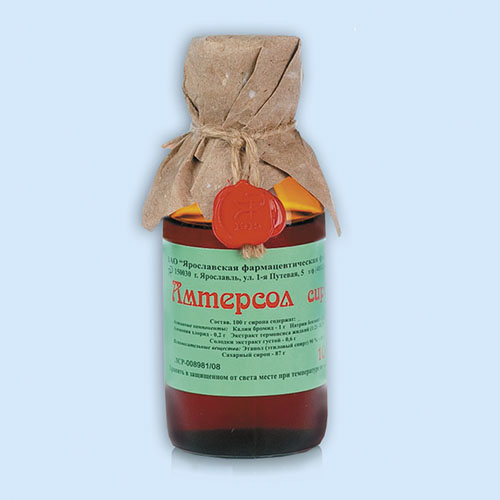
Сироп: фл. 100 г
рег. №: ЛСР-008981/08
от 17.11.08
Бактериофаг клебсиелл пневмонии очищенный
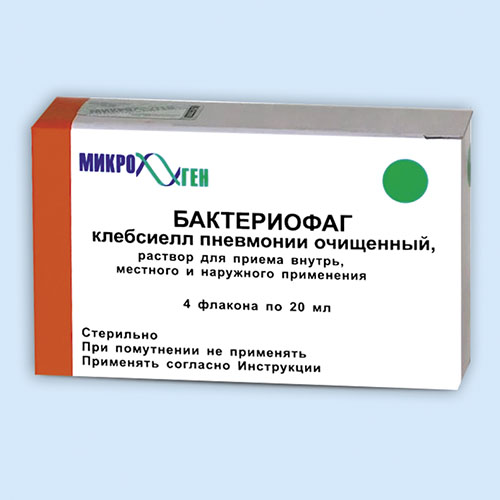
Р-р д/приема внутрь, местного и наружного прим. 10 мл: фл. 4 или 10 шт.
рег. №: ЛС-001297
от 10.06.11
Дата перерегистрации: 11.05.18
Р-р д/приема внутрь, местн. и наружн. прим. 20 мл: фл. 4 шт.
рег. №: ЛС-001297
от 10.06.11
Дата перерегистрации: 11.05.18
Бактериофаг клебсиелл поливалентный очищенный
Р-р д/приема внутрь, местного и наружного прим. 10 мл: фл. 4 или 10 шт.
рег. №: ЛС-001361
от 07.07.11
Дата перерегистрации: 11.05.18
Р-р д/приема внутрь, местн. и наружн. прим. 20 мл: фл. 4 шт.
рег. №: ЛС-001361
от 07.07.11
Дата перерегистрации: 11.05.18
Бактериофаг коли
Р-р д/приема внутрь, местн. и наружн. прим.: фл. 20 мл или 100 мл
рег. №: Р N001977/01
от 18.03.09
Бактериофаг колипротейный
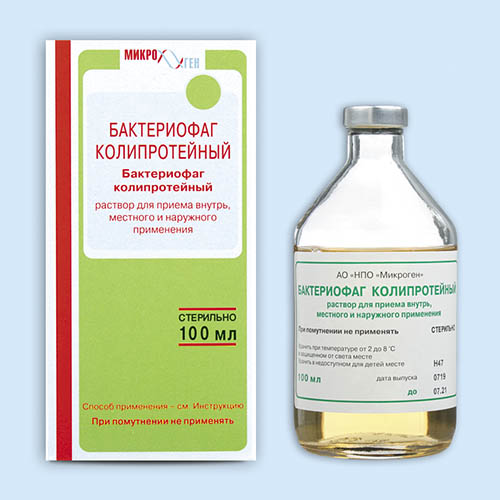
Р-р д/приема внутрь, местн. и наружн. прим. 20 мл: фл. 8 шт.
рег. №: ЛС-001998
от 27.10.11
Дата перерегистрации: 11.05.18
Р-р д/приема внутрь, местн. и наружн. прим. 100 мл: фл. 1 шт.
рег. №: ЛС-001998
от 27.10.11
Дата перерегистрации: 11.05.18
Бактериофаг стрептококковый
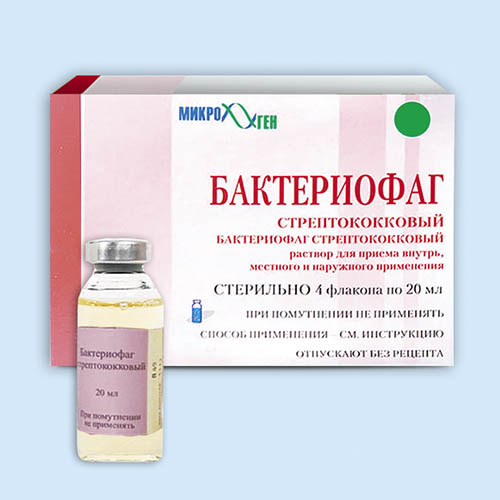
Р-р д/приема внутрь, мест.и наружн. применения
рег. №: Р N001974/01
от 19.01.09
Бриония

Мазь д/наружн. прим. гомеоп.: 15 или 25 г банки или фл.
рег. №: Р N000729/01
от 20.12.11
Бриония-ГФ
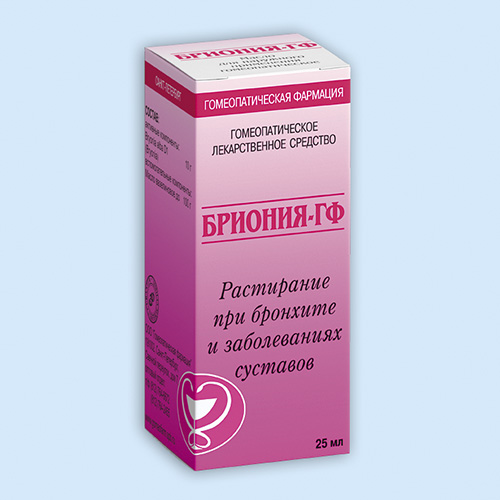
Масло д/наружн. прим. гомеопатическое: фл. 15 г или 25 г
рег. №: Р N000729/02
от 27.02.08
Бронхикум® С
Пастилки 100 мг: 20 шт.
рег. №: ЛСР-010619/08
от 26.12.08
Дата перерегистрации: 16.03.17
Бронхикум® ТП
Эликсир 5 г+2.5 г/100 г: фл. 130 г в компл. со стаканчиком-дозатором
рег. №: ЛСР-005678/08
от 21.07.08
Бронхипрет®

Сироп: фл. 50 мл или 100 мл с дозир. устройством и мерн. стаканчиком
рег. №: ЛС-000181
от 05.04.10
Бронхипрет® ТП
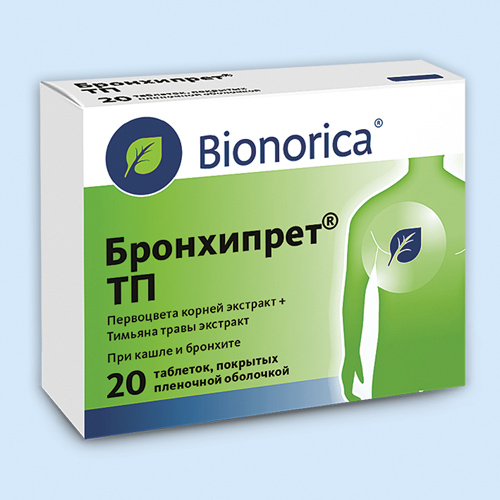
Таб., покр. пленочной оболочкой: 20, 50 или 100 шт.
рег. №: ЛС-001464
от 30.12.11
Фасовка, упаковка и выпускающий контроль качества:
BIONORICA
(Германия)
Бронхо-Ваксом® взрослый
Капс. 7 мг: 10 или 30 шт.
рег. №: П N011540/01
от 26.12.11
Бронхо-Ваксом® детский
Капс. 3.5 мг: 10 или 30 шт.
рег. №: П N011539/01
от 23.12.11
Бронхобос®
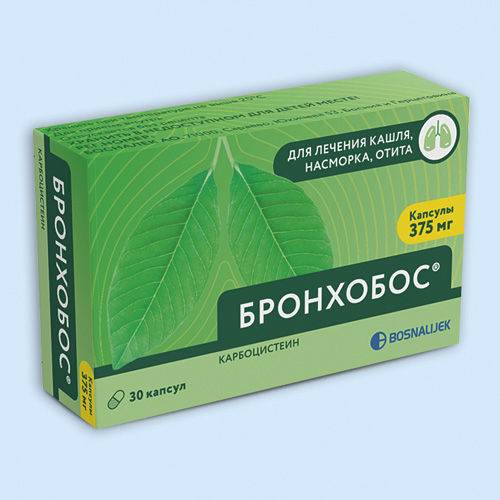
Капс. 375 мг: 30 шт.
рег. №: ЛС-000081
от 25.02.10
Дата перерегистрации: 14.01.13
Сироп 2.5% (125 мг/5 мл): фл. 200 мл в компл. с мерной ложечкой
рег. №: П N014180/01
от 06.05.08
Дата перерегистрации: 18.06.18
Сироп 5% (250 мг/5 мл): фл. 200 мл в компл. с мерной ложечкой
рег. №: П N014180/01
от 06.05.08
Дата перерегистрации: 18.06.18
Виферон®
Гель д/наружн. и местн. прим. 36000 МЕ/1 г: туба 12 г
рег. №: Р N001142/02
от 13.04.10
Галавит®
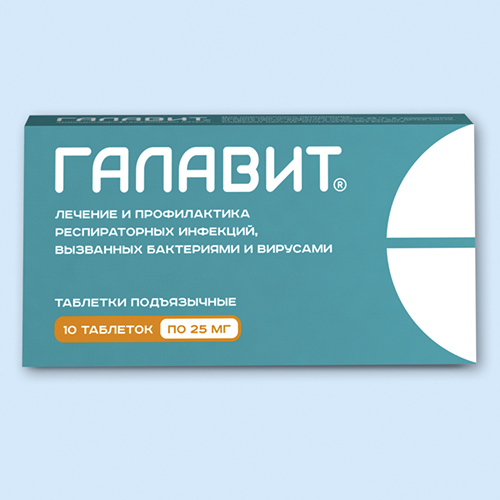
Таб. подъязычные 25 мг: 10, 20, 30, 40, 60 или 80 шт.
рег. №: ЛСР-008746/09
от 02.11.09
Геделикс®
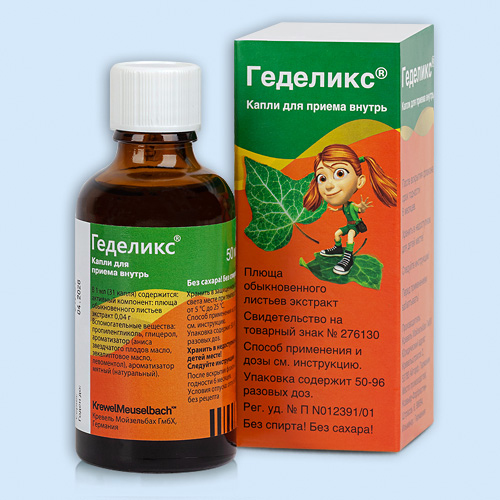
Капли д/приема внутрь 4 г/100 мл: фл.-капельн. 50 мл 1 шт.
рег. №: П N012391/01
от 01.12.11
Геделикс®
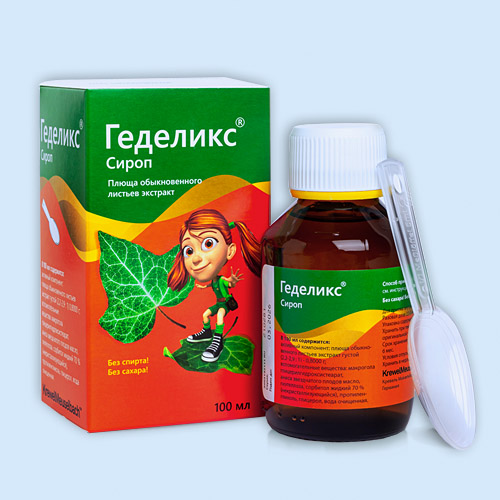
Сироп 0.8 г/100 мл: фл. 100 мл в компл. с мерн. ложкой, фл. 200 мл в компл. с мерн. шприцем
рег. №: П N012391/02
от 01.12.11
Гексо Бронхо®
Сироп 100 мг/5 мл: фл. 150 мл в компл. с мерн. стаканчиком
рег. №: ЛП-003887
от 06.10.16
Гликодин
Сироп 10 мг+10 мг+3.75 мг/5 мл: фл. 50 мл или 100 мл, бутылки 50 мл или 100 мл
рег. №: П N012064/01
от 25.05.11
Гомеовокс®

Таб., покр. оболочкой, гомеопатические: 60 или 100 шт.
рег. №: П N009837
от 07.05.10
контакты:
БУАРОН
(Франция)
Грудной сбор №2
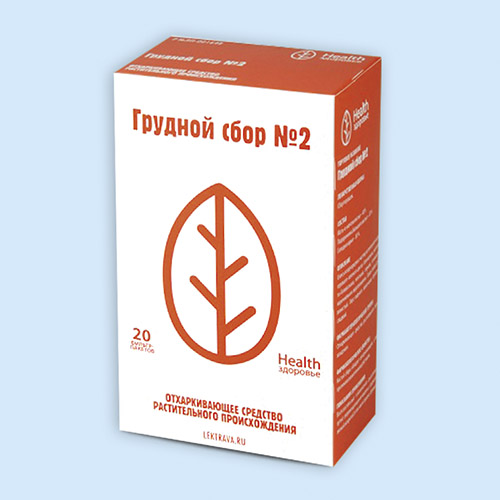
Сбор растительный — сырье измельченное: 2 г фильтр-пакеты 10 или 20 шт.
рег. №: ЛП-001648
от 12.04.12
Сбор растительный — сырье измельченное: пачки 35 г или 50 г
рег. №: Р N003947/01
от 06.10.09
Грудной сбор №4
Сбор растительный — сырье измельченное: пачки 30 г, 50 г, 75 г или 100 г
рег. №: ЛС-001625
от 04.04.11
Доктор МОМ®

Сироп: фл. 100 мл или 150 мл в компл. с мерн. стаканчиком
рег. №: П N015983/01
от 30.11.09
Доктор МОМ® растительные пастилки от кашля

Пастилки (ягодные): 20 шт.
рег. №: П N013064/01
от 10.05.07
Дата перерегистрации: 31.05.21
Пастилки (фруктовые): 20 шт.
рег. №: П N013064/01
от 10.05.07
Дата перерегистрации: 31.05.21
Пастилки (апельсиновые): 20 шт.
рег. №: П N013064/01
от 10.05.07
Дата перерегистрации: 31.05.21
Пастилки (лимонные): 20 шт.
рег. №: П N013064/01
от 10.05.07
Дата перерегистрации: 31.05.21
Пастилки (клубничные): 20 шт.
рег. №: П N013064/01
от 10.05.07
Дата перерегистрации: 31.05.21
Пастилки (малиновые): 20 шт.
рег. №: П N013064/01
от 10.05.07
Дата перерегистрации: 31.05.21
Пастилки (ананасовые): 20 шт.
рег. №: П N013064/01
от 10.05.07
Дата перерегистрации: 31.05.21
Доктор Тайсс Бронхосепт
Капли д/приема внутрь: фл. 30 мл в компл. с крышкой-капельницей
рег. №: ЛС-002144
от 27.10.11
Доктор Тайсс сироп с подорожником
Сироп 5 г/100 г: фл. 50 мл, 100 мл или 250 мл
рег. №: П N011635/01
от 11.05.10
Доритрицин®
Таб. д/рассасывания: 10 или 20 шт.
рег. №: ЛСР-004409/10
от 18.05.10
Иммунекс®
Сироп 10 г/100 г: фл. 50, 100 или 125 г
рег. №: ЛС-001141
от 18.08.10
Ингафитол №1 (сбор для ингаляций №1)
Сбор растительный — сырье измельченное 50%+50%: пачки 30 г, 40 г, 50 г, 60 г, 75 г или 100 г
рег. №: ЛС-001497
от 06.07.11
Ингафитол №2 (сбор для ингаляций №2)
Сбор растительный — сырье измельченное 50%+50%: пачки 30 г, 40 г, 50 г, 60 г, 75 г или 100 г
рег. №: ЛСР-000176/08
от 24.01.08
Исмиген®
Таб. подъязычные 7 мг: 10 или 30 шт.
рег. №: ЛП-002210
от 30.08.13
Кармолис
Капли д/приема внутрь и наружн. прим.: фл. 1.5 мл, 5 мл, 20 мл, 40 мл или 80 мл
рег. №: П N015043/01
от 01.07.08
Кука
Сироп: фл. 100 мл
рег. №: П N012497/01
от 18.09.08
Лазолван® ФИТО

Сироп 150 мг/1 мл: мини-пакеты 5 мл 20 шт.; фл. 100 мл в компл. со стаканчиком-дозатором
рег. №: ЛСР-002221/07
от 15.08.07
Либексин Муко®
Сироп 50 мг/1 мл: фл. 125 мл, 200 мл или 300 мл в компл. с мерн. стаканчиком
рег. №: П N013994/01
от 25.04.08
Либексин Муко®
Сироп д/детей 20 мг/1 мл: фл. 125 мл или 200 мл в компл. с мерн. ложкой
рег. №: П N013994/02
от 25.04.08
Линкас®
Сироп: фл. 90 мл
рег. №: П N012215/01
от 01.08.11
Линкас® Балм
Мазь д/наружн. прим.: фл. 25 г
рег. №: ЛП-000878
от 18.10.11
Линкас® ЛОР
Пастилки (апельсиновые): 16 шт.
рег. №: П N015878/01
от 12.08.09
Пастилки (мятные): 16 шт.
рег. №: П N015878/01
от 12.08.09
Пастилки (лимонно-медовые): 16 шт.
рег. №: П N015878/01
от 12.08.09
Ментолатум Балм
Мазь д/наружн. прим.: банки 30 г
рег. №: ЛСР-010210/08
от 15.12.08
Ментоловое масло
Р-р д/местн. прим. и ингаляций 1%: 10 мл или 25 мл фл. или фл.-капельн.
рег. №: ЛП-001236
от 17.11.11
Р-р д/местн. прим. и ингаляций 2%: 10 мл или 25 мл фл. или фл.-капельн.
рег. №: ЛП-001236
от 17.11.11
Микстура от кашля для взрослых сухая
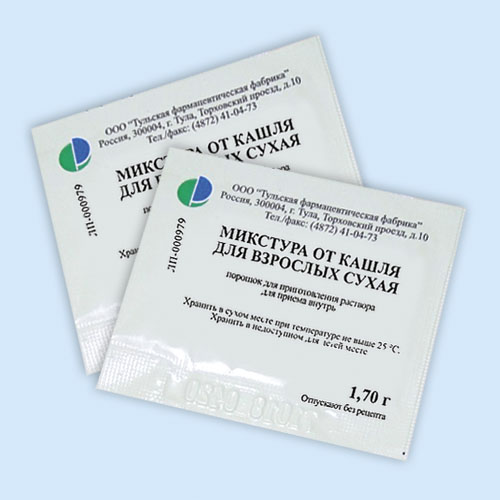
Порошок д/пригот. р-ра д/приема внутрь: пак. 1.7 г
рег. №: ЛП-000979
от 18.10.11
Микстура от кашля для детей сухая
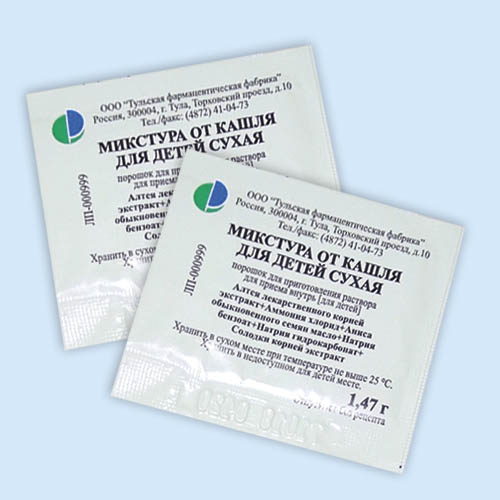
Порошок д/пригот. р-ра д/приема внутрь (для детей): пак. 1.47 г
рег. №: ЛП-000999
от 18.10.11
Микстура от кашля для детей сухая
Порошок д/пригот. р-ра д/приема внутрь: пак. 1.47 г 5 или 10 шт.
рег. №: Р N003703/01
от 15.06.09
ОКИ

Р-р д/полоскания 1.6%: фл. 150 мл компл. с мерн. стаканчиком
рег. №: П N010598/03
от 09.06.10
Оралсепт®

Спрей д/местн. прим. дозированный 0.255 мг/1 доза: фл. 30 мл (176 доз) с дозатором и наконечником
рег. №: ЛП-(001324)-(РГ-RU )
от 21.10.22
Пертуссин-Ч
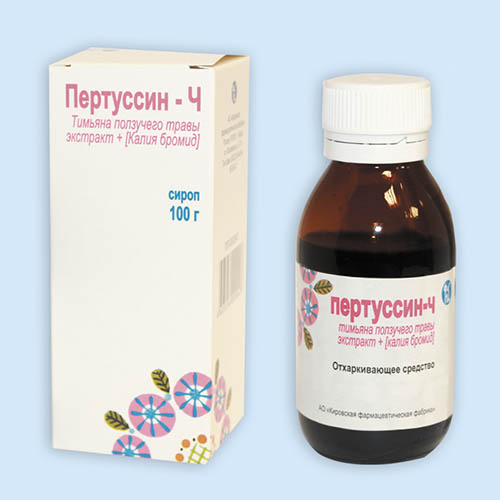
Сироп 12 г+1 г/100 г: фл. 100 или 125 г
рег. №: ЛП-000247
от 16.02.11
Пиобактериофаг комплексный
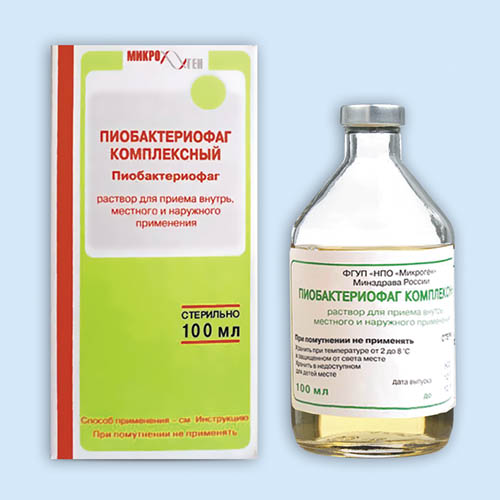
Р-р д/приема внутрь, местн. и наружн. прим. 20 мл: фл. 8 шт.
рег. №: ЛС-000700
от 21.06.10
Дата перерегистрации: 29.06.20
Р-р д/приема внутрь, местн. и наружн. прим. 100 мл: фл. 1 шт.
рег. №: ЛС-000700
от 21.06.10
Дата перерегистрации: 29.06.20
Пиобактериофаг поливалентный очищенный
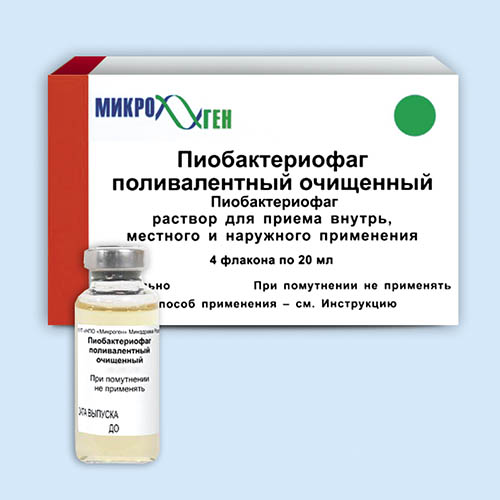
Р-р д/приема внутрь, местн. и наружн. прим.: фл. 10 мл 4 или 10 шт.
рег. №: ЛС-002031
от 04.12.12
Р-р д/приема внутрь, местн. и наружн. прим.: фл. 20 мл 4 или 10 шт.
рег. №: ЛС-002031
от 04.12.12
Полиоксидоний®
Таб. 12 мг: 10 или 20 шт.
рег. №: Р N002935/04
от 15.09.09
Проспан
Сироп 7 мг/1 мл: фл. 100 мл или 200 мл с пробкой-дозатором
рег. №: П N011382/01
от 02.02.11
Ренгалин®
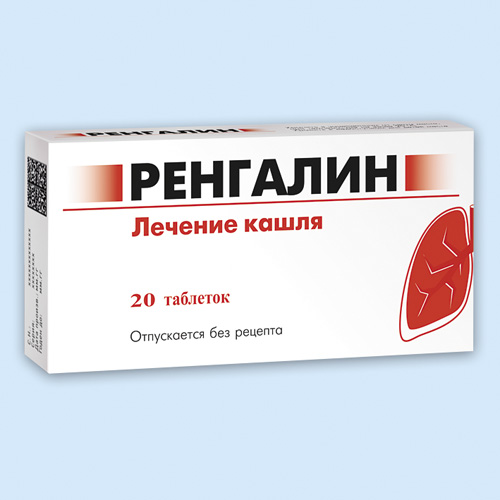
Таб. д/рассасывания: 20 шт.
рег. №: ЛП-(000032)-(РГ-RU )
от 19.12.19
Ренгалин®
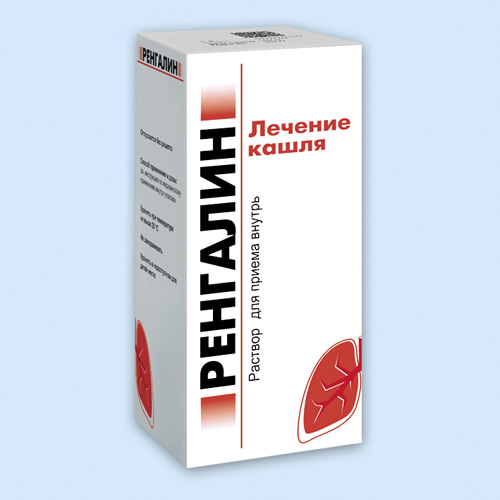
Р-р д/приема внутрь: фл. 100 мл c капельницей
рег. №: ЛП-(000017)-(РГ-RU )
от 11.12.19
Санорин с маслом эвкалипта
Капли назальные 0.1%: фл. 10 мл с капельницей
рег. №: П N011463/03
от 14.11.11
Санорин®
Спрей назальный 0.1%: фл. 10 мл с дозир. аппликатором
рег. №: П N011463/02
от 07.07.10
Секстафаг
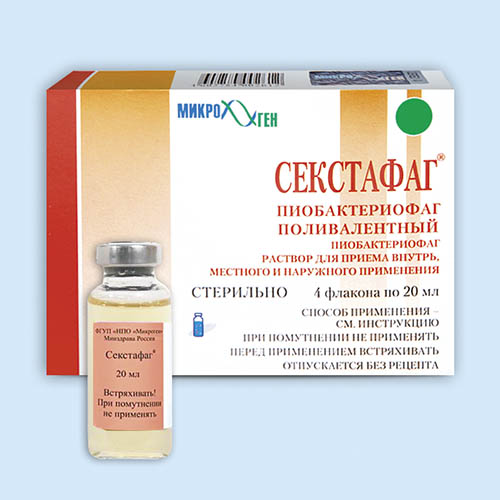
Р-р д/приема внутрь, местн. и наружн. прим.: фл. 20 мл 4 или 10 шт.
рег. №: ЛС-001049
от 14.02.12
Солодки корни
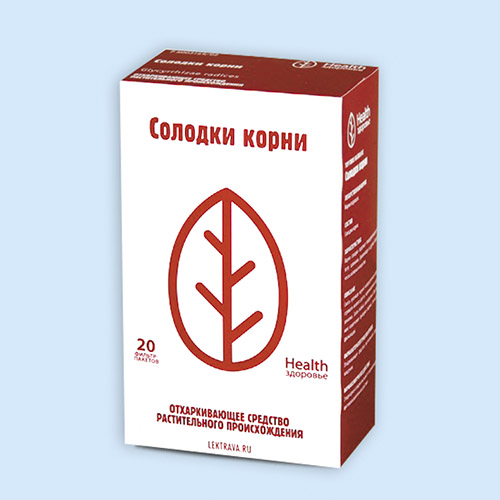
Сырье растительное-порошок 1.5 г: фильтр-пакеты 10 или 20 шт.
рег. №: Р N003169/01
от 01.04.11
Сырье растительное-порошок 1.5 г: фильтр-пакеты 10 или 20 шт.
рег. №: Р N003169/02
от 21.02.11
Сосны почки
Сырье растительное: пачки 50 г или 75 г
рег. №: ЛП-000426
от 28.02.11
Стопангин 2A
Таб. д/рассасывания мятные 2 мг+1 мг: 24 шт.
рег. №: ЛСР-010760/09
от 29.12.09
Таб. д/рассасывания апельсиновые 2 мг+1 мг: 24 шт.
рег. №: ЛСР-010760/09
от 29.12.09
Таб. д/рассасывания лимонные 2 мг+1 мг: 24 шт.
рег. №: ЛСР-010760/09
от 29.12.09
Таб. д/рассасывания клубничные 2 мг+1 мг: 24 шт.
рег. №: ЛСР-010760/09
от 29.12.09
контакты:
ТЕВА
(Израиль)
Стоптуссин-Фито
Сироп 4.1666 г+4.1666 г+4.1666 г/100 г: фл. 100 мл в компл. с мерн. колпачком
рег. №: П N016272/01
от 01.03.10
контакты:
ТЕВА
(Израиль)
Суприма-Бронхо
Сироп: фл. 100 мл
рег. №: П N014398/01
от 17.11.08
Суприма-Плюс
Мазь: банка 20 г
рег. №: П N014110/01
от 09.09.08
Таблетки от кашля
Таб. 6.7 мг+250 мг: 10 шт.
рег. №: ЛС-001287
от 16.08.11
Таблетки от кашля
Таб. 6.7 мг+250 мг: 20, 30 или 50 шт.
рег. №: ЛС-002080
от 28.04.11
Тантум® Верде
Спрей д/местного прим. дозированный 0.255 мг/1 доза: фл. 30 мл (176 доз)
рег. №: ЛП-(000747)-(РГ-RU )
от 04.05.22
Терасил-Д
Сироп 10 мг+5 мг+2 мг/5 мл: фл. 60 мл или 100 мл в компл. с мерн. стаканчиком
рег. №: ЛСР-003638/10
от 30.04.10
Терафлю ЛАР
Таб. д/рассасывания 1 мг+1 мг: 16 шт.
рег. №: ЛС-002042
от 17.06.11
Дата перерегистрации: 25.10.17
Терафлю® ЛАР
Спрей д/местн. прим. 2 мг+1.5 мг/1 мл: фл. 30 мл в компл. с распыляющим устройством
рег. №: ЛС-001853
от 05.08.11
Терафлю® ЛАР Ментол
Таб. д/рассасывания (ментоловые) 2 мг+1 мг: 20 шт.
рег. №: ЛП-000981
от 18.10.11
Тимоген®
Спрей назальный дозированный 25 мкг/1 доза: фл. 10 мл (не менее 80 доз) с насосом-дозатором
рег. №: ЛП-(000640)-(РГ-RU )
от 24.03.22
Туссамаг
Сироп 9% (без сахара): фл. 175 г
рег. №: П N014420/01
от 16.11.12
Сироп 9 г/100 г: фл. 200 г
рег. №: П N012235/01
от 19.11.07
Произведено:
MERCKLE
(Германия)
контакты:
ТЕВА
(Израиль)
Укропа пахучего плоды
Сырье растительное 50 г: пачка
рег. №: ЛП-001028
от 18.10.11
Умкалор
Р-р д/приема внутрь 80 г/100 г: фл. 20 мл или 50 мл с капельн.
рег. №: П N010150
от 01.09.11
Фенхеля обыкновенного плоды
Сырье растительное: пачки 50, 75 или 100 г
рег. №: ЛП-000791
от 03.10.11
Сырье растительное 50 г: пачки
рег. №: 71/609/27
от 23.08.71
Фиалки трава
Сырье растительное измельченное: пачки 50 г или 75 г
рег. №: ЛП-000413
от 28.02.11
Шалфей
Таб. д/рассасывания: 10 или 20 шт.
рег. №: П N011411/01
от 02.03.09
Эвкалипт-М
Пастилки 6 мг+5.5 мг: 12 или 24 шт.
рег. №: П N012101/02
от 05.03.09
Эвкалипт-М

Таб. д/рассасывания 6 мг+5.5 мг: 20 шт.
рег. №: П N012101/01
от 02.03.09
Произведено и упаковано:
HERKEL B.V.
(Нидерланды)
Эвкалипта настойка
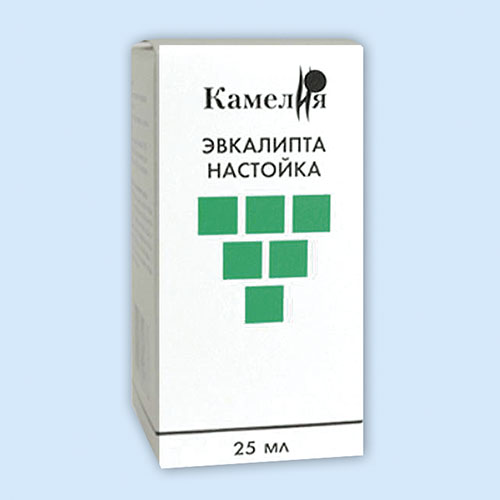
Настойка (200 г/1 л): фл. 25, 30 или 50 мл
рег. №: ЛП-000743
от 29.09.11
Эвкалипта настойка
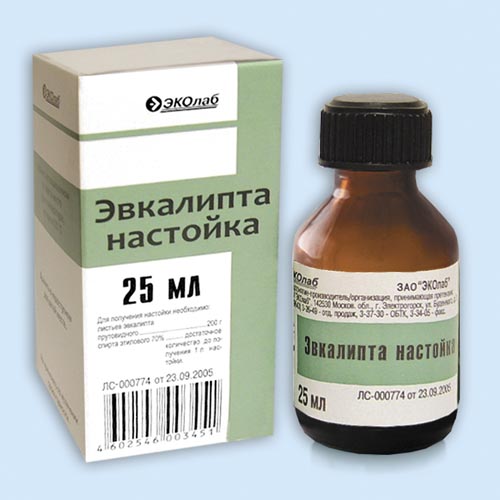
Настойка (200 г/1 л): фл. 25 мл или 40 мл
рег. №: ЛС-000774
от 06.05.10
Эвкалиптовое масло
Масло д/местного прим.: 25 мл фл.
рег. №: Р N003482/01
от 30.04.11
Как правильно пишется слово «ларингит»
ларинги́т
ларинги́т, -а
Источник: Орфографический
академический ресурс «Академос» Института русского языка им. В.В. Виноградова РАН (словарная база
2020)
Делаем Карту слов лучше вместе
Привет! Меня зовут Лампобот, я компьютерная программа, которая помогает делать
Карту слов. Я отлично
умею считать, но пока плохо понимаю, как устроен ваш мир. Помоги мне разобраться!
Спасибо! Я стал чуточку лучше понимать мир эмоций.
Вопрос: эскадра — это что-то нейтральное, положительное или отрицательное?
Ассоциации к слову «ларингит»
Синонимы к слову «ларингит»
Предложения со словом «ларингит»
- Пришлось идти к врачу, который тут же определил, что у подростка – хронический ларингит.
- Он констатировал только тяжёлую форму ларингита и порез голосовых связок.
- – Шеф полиции сказал то же самое, когда я ему пожаловался. Решил, что это работник службы доставки, больной ларингитом.
- (все предложения)
Цитаты из русской классики со словом «ларингит»
- — Ларингит, — машинально молвил я, привыкнув уже за месяц бешеной гонки к деревенским молниеносным диагнозам.
- «Вот оно. Началось! — мелькнуло у меня в голове, и я никак не мог попасть ногами в туфли. — А, черт! Спички не загораются. Что ж, рано или поздно это должно было случиться. Не всю же жизнь одни ларингиты да катары желудка».
- (все
цитаты из русской классики)
Каким бывает «ларингит»
Значение слова «ларингит»
-
ЛАРИНГИ́Т, -а, м. Мед. Воспаление слизистой оболочки гортани. Острый ларингит. Хронический ларингит. (Малый академический словарь, МАС)
Все значения слова ЛАРИНГИТ
Отправить комментарий
Дополнительно
| Laryngitis | |
|---|---|
 |
|
| Endoscopic image of an inflamed larynx caused by acid reflux | |
| Pronunciation |
|
| Specialty | Otorhinolaryngology |
| Symptoms | Hoarse voice, fever, pain[1][2] |
| Duration | Usually less than 2 weeks[1] |
| Causes | Viral, trauma, bacterial[1] |
| Diagnostic method | Based on symptoms, examination via laryngoscopy if concerns[1] |
| Differential diagnosis | Epiglottitis, laryngeal cancer, croup[1] |
| Treatment | Voice rest, fluids[1] |
| Frequency | Common[1] |
Laryngitis is inflammation of the larynx (voice box).[1] Symptoms often include a hoarse voice and may include fever, cough, pain in the front of the neck, and trouble swallowing.[1][2] Typically, these last under two weeks.[1]
Laryngitis is categorised as acute if it lasts less than three weeks and chronic if symptoms last more than three weeks.[1] Acute cases usually occur as part of a viral upper respiratory tract infection,[1] other infections and trauma such as from coughing are other causes.[1] Chronic cases may occur due to smoking, tuberculosis, allergies, acid reflux, rheumatoid arthritis, or sarcoidosis.[1][3] The underlying mechanism involves irritation of the vocal cords.[2]
Concerning signs that may require further investigation include stridor, history of radiation therapy to the neck, trouble swallowing, duration of more than three weeks, and a history of smoking.[1] If concerning signs are present the vocal cords should be examined via laryngoscopy.[1] Other conditions that can produce similar symptoms include epiglottitis, croup, inhaling a foreign body, and laryngeal cancer.[1][4]
The acute form generally resolves without specific treatment.[1] Resting the voice and sufficient fluids may help.[1] Antibiotics generally do not appear to be useful in the acute form.[5] The acute form is common while the chronic form is not.[1] The chronic form occurs most often in middle age and is more common in men than women.[6]
Signs and symptoms[edit]
The primary symptom of laryngitis is a hoarse voice.[7]: 108 Because laryngitis can have various causes, other signs and symptoms may vary.[8] They can include
- Dry or sore throat
- Coughing (both a causal factor and a symptom of laryngitis)
- Frequent throat clearing
- Increased saliva production
- Dysphagia (difficulty swallowing)
- Sensation of swelling in the area of the larynx (discomfort in the front of the neck)
- Globus pharyngeus (feeling like there is a lump in the throat)
- Cold or flu-like symptoms (which, like a cough, may also be a causal factor for laryngitis)
- Swollen lymph nodes in the throat, chest, or face
- Fever
- General muscle pain (myalgia)
- Shortness of breath, predominantly in children
Voice quality[edit]
Aside from a hoarse-sounding voice, changes to pitch and volume may occur with laryngitis. Speakers may experience a lower or higher pitch than normal, depending on whether their vocal folds are swollen or stiff.[1][9] They may also have breathier voices, as more air flows through the space between the vocal folds (the glottis), quieter volume[10] and a reduced range.[1]
Causes[edit]
Laryngitis can be infectious as well as noninfectious in origin. The resulting inflammation of the vocal folds results in a distortion of the sound produced there.[1] It normally develops in response to either an infection, trauma to the vocal folds, or allergies.[3] Chronic laryngitis may also be caused by more severe problems, such as nerve damage, sores, polyps, or hard and thick lumps (nodules) on the vocal cords.[4]
Acute[edit]
Viral[edit]
- Most acute cases of laryngitis are caused by viral infections,[1] the most common of which tend to be rhinovirus, influenza virus, parainfluenza virus, adenovirus, coronavirus, and RSV. In patients who have a compromised immune system, other viruses such as herpes, HIV may also be potential causes.[citation needed]
Bacterial[edit]
- This is another major cause of acute laryngitis, and may develop in conjunction with or due to a viral infection.[1] Common bacterial strains are group A streptococcus, Streptococcus pneumoniae, C. diphtheriae, M. catarrhalis, Haemophilus influenzae, Bordetella pertussis, Bacillus anthracis, and M. tuberculosis. In developing countries, more unusual bacterial causes may occur, such as mycobacterial and syphilitic, though these may occur in developed nations as well.[1]
Fungal[edit]
- Laryngitis caused by fungal infection is common but not frequently diagnosed according to a review by BMJ and can account for up to 10% of acute laryngitis cases.[1] Patients with both functioning and impaired immune systems can develop fungal laryngitis, which may develop as a result of recent antibiotic or inhaled corticosteroids use.[1] Certain strains of fungi that may cause laryngitis include; Histoplasma, Blastomyces, Candida (especially in immunocompromised persons), and Cryptococcus and Coccidioides.[citation needed]
Trauma[edit]
- Often due to excessive use of the vocal folds such as excessive yelling, screaming, or singing. Though this often results in damage to the outer layers of the vocal folds, the subsequent healing may lead to changes in the physiology of the folds.[1] Another potential cause of inflammation may be overuse of the vocal cords.[5] [6] [7] [8] [9] Laryngeal trauma, including iatrogenic (caused by endotracheal intubation), can also result in inflammation of the vocal cords.[11]
Chronic[edit]
Allergies[edit]
- Findings are unclear as to whether asthma may cause symptoms commonly associated with laryngitis.[1] Some researchers have posited that allergic causes of laryngitis are often misdiagnosed as being the result of acid reflux.[12]
Reflux[edit]
- One possible explanation of chronic laryngitis is that inflammation is caused by gastro-oesophageal reflux, which causes subsequent irritation of the vocal folds.[13]
Autoimmune disorders[edit]
- Approximately between 30 and 75% of persons with rheumatoid arthritis report symptoms of laryngitis.[1]
- Symptoms of laryngitis are present in only 0.5–5% of people that have sarcoidosis.[1] According to a meta-analysis by Silva et al. (2007), this disease is often an uncommon cause of laryngeal symptoms and is frequently misdiagnosed as another voice disorder.[14]
Diagnosis[edit]
Diagnosis of different forms of acute laryngitis
- Laryngitis following trauma: This form of laryngitis is usually identified by obtaining a case history providing information on previous phono traumatic experiences, internal trauma caused by recent procedures as well as any previous neck injuries.[1][15]
- Acute viral laryngitis: This form of laryngitis is characterized by lower vocal pitch as well as hoarseness.[1][15] The symptoms in this form of laryngitis are usually present for less than one week, however they can persist for 3–4 weeks.[1] This form of laryngitis might also be accompanied by upper respiratory tract symptoms such as: sore throat, odynophagia, rhinorrhea, dyspnea, postnasal discharge, and congestion.[1]
- Fungal laryngitis: A biopsy and culture of abnormal lesion may help confirm fungal laryngitis.[1]
Visual diagnosis[edit]
The larynx itself will often show erythema (reddening) and edema (swelling). This can be seen with laryngoscopy or stroboscopy (method depends on the type of laryngitis).[7]: 108 Stroboscopy may be relatively normal or may reveal asymmetry, aperiodicity, and reduced mucosal wave patterns.[16]
Other features of the laryngeal tissues may include[citation needed]
- Redness of the laryngeal tissues (acute)
- Dilated blood vessels (acute)
- Thick, yet dry laryngal tissue (chronic)
- Stiff vocal folds
- Sticky secretions between the vocal folds and nearby structures (the interarytenoid region)
Referral[edit]
Some signs and symptoms indicate the need for early referral.[1] These include
- Difficulty swallowing
- Vocal stridor
- Ear pain
- Recent weight loss
- History of smoking
- Current or recent radiotherapy treatment (in the neck region)
- Recent neck surgery or surgery involving endotracheal tubing
- Person is a professional voice user (teacher, singer, actor, call center worker, and so on)
Differential diagnosis[edit]
- Acute epiglottitis: This is more likely in those with stridor, drooling, and painful or trouble swallowing.[1]
- Spasmodic dysphonia[16]
- Reflux laryngitis[16]
- Chronic allergic laryngitis[16]
- Neoplasm[16]
- Croup: This presents with a barking cough, hoarseness of voice, and inspiratory stridor.[15]
Treatment[edit]
Treatment is often supportive in nature, and depends on the severity and type of laryngitis (acute or chronic).[1] General measures to relieve symptoms of laryngitis include behaviour modification, hydration and humidification.[1]
Vocal hygiene (care of the voice) is very important to relieve symptoms of laryngitis. Vocal hygiene involves measures such as: resting the voice, drinking sufficient water, reducing caffeine and alcohol intake, stopping smoking and limiting throat clearing.[1]
Acute laryngitis[edit]
In general, acute laryngitis treatment involves vocal hygiene, painkillers (analgesics), humidification, and antibiotics.[1][5]
Viral[edit]
The suggested treatment for viral laryngitis involves vocal rest, pain medication, and mucolytics for frequent coughing.[7] Home remedies such as tea and honey may also be helpful.[1] Antibiotics are not used for treatment of viral laryngitis.[1][17]
Bacterial[edit]
Antibiotics may be prescribed for bacterial laryngitis, especially when symptoms of upper respiratory infection are present.[7] However, the use of antibiotics is highly debated for acute laryngitis. This relates to issues of effectiveness, side effects, cost, and possibility of antibiotic resistance patterns. Overall, antibiotics do not appear to be very effective in the treatment of acute laryngitis.[5]
In severe cases of bacterial laryngitis, such as supraglottitis or epiglottitis, there is a higher risk of the airway becoming blocked.[7] An urgent referral should be made to manage the airway.[1] Treatment may involve humidification, corticosteroids, intravenous antibiotics, and nebulised adrenaline.[7]
Fungal[edit]
Fungal laryngitis can be treated with oral antifungal tablets and antifungal solutions.[1][7] These are typically used for up to three weeks and treatment may need to be repeated if the fungal infection returns.[7]
Trauma[edit]
Laryngitis caused by excessive use or misuse of the voice can be managed though vocal hygiene measures.[citation needed]
Chronic laryngitis[edit]
Reflux[edit]
Laryngopharyngeal reflux treatment primarily involves behavioural management and medication.[1][7] Behavioural management involves aspects such as
- Wearing loose clothing
- Eating smaller, more frequent meals
- Avoiding certain foods (e.g. caffeine, alcohol, spicy foods)[7]
Anti-reflux medications may be prescribed for patients with signs of chronic laryngitis and hoarse voice.[18] If anti-reflux treatment does not result in a decrease of symptoms, other possible causes should be examined.[1] Over-the-counter medications for neutralizing acids (antacids) and acid suppressants (H-2 blockers) may be used.[7] Antacids are often short-acting and may not be sufficient for treatment.[7] Proton pump inhibitors are an effective type of medication.[7] These should only be prescribed for a set period of time, after which the symptoms should be reviewed.[1] Proton pump inhibitors do not work for everyone. A physical reflux barrier (e.g. Gaviscon Liquid) may be more appropriate for some.[1] Antisecretory medications can have several side-effects.[1]
When appropriate, anti-reflux surgery may benefit some individuals.[1]
Inflammatory[edit]
When treating allergic laryngitis, topical nasal steroids and immunotherapy have been found to be effective for allergic rhinitis.[7] Antihistamines may also be helpful, but can create a dryness in the larynx.[7] Inhaled steroids that are used for a long period can lead to problems with the larynx and voice.[7]
Autoimmune[edit]
Mucous membrane pemphigoid may be managed with medication (cyclophosphamide and prednisolone).[1]
Granulomatous[edit]
Sarcoidosis is typically treated with systemic corticosteroids. Less frequently used treatments include intralesional injections or laser resection.[1]
Prognosis[edit]
Acute[edit]
Acute laryngitis may persist, but will typically resolve on its own within two weeks.[1] Recovery is likely to be quick if the patient follows the treatment plan.[19] In viral laryngitis, symptoms can persist for an extended period, even when upper respiratory tract inflammation has been resolved.[17]
Chronic[edit]
Laryngitis that continues for more than three weeks is considered chronic.[1] If laryngeal symptoms last for more than three weeks, a referral should be made for further examination, including direct laryngoscopy.[1] The prognosis for chronic laryngitis varies depending on the cause of the laryngitis.[19]
References[edit]
- ^ a b c d e f g h i j k l m n o p q r s t u v w x y z aa ab ac ad ae af ag ah ai aj ak al am an ao ap aq ar as at au av aw ax ay az ba bb bc bd be bf Wood, John M.; Athanasiadis, Theodore; Allen, Jacqui (9 October 2014). «Laryngitis». BMJ. 349: g5827. doi:10.1136/bmj.g5827. ISSN 1756-1833. PMID 25300640. S2CID 216101435. Archived from the original on 13 November 2016. Retrieved 21 November 2016.
- ^ a b c «Laryngitis — National Library of Medicine». PubMed Health. Archived from the original on 10 September 2017. Retrieved 9 November 2016.
- ^ a b Dworkin, James Paul (April 2008). «Laryngitis: Types, Causes, and Treatments». Otolaryngologic Clinics of North America. 41 (2): 419–436. doi:10.1016/j.otc.2007.11.011. PMID 18328379.
- ^ Ferri, Fred F. (2016). Ferri’s Clinical Advisor 2017: 5 Books in 1. Elsevier Health Sciences. p. 709. ISBN 9780323448383. Archived from the original on 10 November 2016.
- ^ a b c Reveiz, L; Cardona, AF (23 May 2015). «Antibiotics for acute laryngitis in adults». Cochrane Database of Systematic Reviews. 5 (5): CD004783. doi:10.1002/14651858.CD004783.pub5. PMC 6486127. PMID 26002823.
- ^ Dhingra, P. L.; Dhingra, Shruti (2014). Diseases of Ear, Nose and Throat (6 ed.). Elsevier Health Sciences. p. 292. ISBN 9788131236932. Archived from the original on 10 November 2016.
- ^ a b c d e f g h i j k l m n o p Colton, Raymond H.; Casper, Janina K.; Leonard, Rebecca (2011). Understanding Voice Problems (4th ed.). Baltimore, MD: Lippincott Williams & Wilkins. pp. 308–309. ISBN 978-1-60913-874-5.
- ^ Verdolini, Katherine; Rosen, Clark A.; Branksi, Ryan C., eds. (2006). Classification Manual of Voice Disorders-I. American Speech-Language-Hearing Association. Mahwah, N.J: Lawrence Erlbaum.
- ^ Takahashi, H.; Koike, Y. (1976). «Some perceptual dimensions and acoustical correlates of pathologic voices». Acta Oto-Laryngologica Supplementum (338): 1–24.
- ^ Shipp, Thomas; Huntington, Dorothy A. (1 November 1965). «Some Acoustic and Perceptual Factors in Acute-Laryngitic Hoarseness». Journal of Speech and Hearing Disorders. 30 (4): 350–9. doi:10.1044/jshd.3004.350. ISSN 0022-4677. PMID 5835492.
- ^ Rieger, A.; Hass, I.; Gross, M.; Gramm, HJ; Eyrich, K. (1996). «Intubation trauma of the larynx—a literature review with special reference to arytenoid cartilage dislocation». Anasthesiol Intensivmed Notfallmed Schmerzther. 31 (5): 281–287. doi:10.1055/s-2007-995921. PMID 8767240.
- ^ Brook, Christopher; Platt, Michael; Reese, Stephen; Noordzij, Pieter (January 2016). «Utility of Allergy Testing in Patients with Chronic Laryngopharyngeal Symptoms: Is It Allergic Laryngitis?». Otolaryngology–Head and Neck Surgery. 154 (1): 41–45. doi:10.1177/0194599815607850. PMID 26428475. S2CID 24593040.
- ^ Joniau, Sander; Bradshaw, Anthony; Esterman, Adrian; Carney, A. Simon (May 2007). «Reflux and laryngitis: A systematic review». Otolaryngology–Head and Neck Surgery. 136 (5): 686–692. doi:10.1016/j.otohns.2006.12.004. PMID 17478199. S2CID 24123158.
- ^ Silva, Leonardo; Damrose, Edward; Bairao, Fernanda; Nina, Mayra; Junior, James; Costa, Henrique (June 2008). «Infectious granulomatous laryngitis: a retrospective study of 24 cases». European Archives of Oto-Rhino-Laryngology. 265 (6): 675–680. doi:10.1007/s00405-007-0533-4. PMID 18060554. S2CID 19082413.
- ^ a b c House, SA (December 2017). «Hoarseness in Adults». Am Fam Physician. 11 (11): 720–728. PMID 29431404.
- ^ a b c d e Gupta G, Mahajan K (2020). «Acute Laryngitis». Statpearls. PMID 30521292.
Text was copied from this source, which is available under a Creative Commons Attribution 4.0 International License.
- ^ a b Dominguez, L. M.; Simpson, C. B. (December 2015). «Viral laryngitis». Current Opinion in Otolaryngology & Head and Neck Surgery. 23 (6): 454–458. doi:10.1097/moo.0000000000000203. PMID 26397458. S2CID 10954996.
- ^ Schwartz, Seth R.; Cohen, Seth M.; Dailey, Seth H.; Rosenfeld, Richard M.; Deutsch, Ellen S.; Gillespie, M. Boyd; Granieri, Evelyn; Hapner, Edie R.; Kimball, C. Eve (1 September 2009). «Clinical Practice Guideline Hoarseness (Dysphonia)». Otolaryngology–Head and Neck Surgery. 141 (3 suppl): S1–S31. doi:10.1016/j.otohns.2009.06.744. ISSN 0194-5998. PMID 19729111. S2CID 14655786. Archived from the original on 9 July 2015. Retrieved 20 November 2016.
- ^ a b Jonas, Nico (2007). «Laryngitis Management». Journal of Modern Pharmacy. 14 (5): 44.
External links[edit]
- Laryngitis at Curlie
- Mayo Clinic
| Laryngitis | |
|---|---|
 |
|
| Endoscopic image of an inflamed larynx caused by acid reflux | |
| Pronunciation |
|
| Specialty | Otorhinolaryngology |
| Symptoms | Hoarse voice, fever, pain[1][2] |
| Duration | Usually less than 2 weeks[1] |
| Causes | Viral, trauma, bacterial[1] |
| Diagnostic method | Based on symptoms, examination via laryngoscopy if concerns[1] |
| Differential diagnosis | Epiglottitis, laryngeal cancer, croup[1] |
| Treatment | Voice rest, fluids[1] |
| Frequency | Common[1] |
Laryngitis is inflammation of the larynx (voice box).[1] Symptoms often include a hoarse voice and may include fever, cough, pain in the front of the neck, and trouble swallowing.[1][2] Typically, these last under two weeks.[1]
Laryngitis is categorised as acute if it lasts less than three weeks and chronic if symptoms last more than three weeks.[1] Acute cases usually occur as part of a viral upper respiratory tract infection,[1] other infections and trauma such as from coughing are other causes.[1] Chronic cases may occur due to smoking, tuberculosis, allergies, acid reflux, rheumatoid arthritis, or sarcoidosis.[1][3] The underlying mechanism involves irritation of the vocal cords.[2]
Concerning signs that may require further investigation include stridor, history of radiation therapy to the neck, trouble swallowing, duration of more than three weeks, and a history of smoking.[1] If concerning signs are present the vocal cords should be examined via laryngoscopy.[1] Other conditions that can produce similar symptoms include epiglottitis, croup, inhaling a foreign body, and laryngeal cancer.[1][4]
The acute form generally resolves without specific treatment.[1] Resting the voice and sufficient fluids may help.[1] Antibiotics generally do not appear to be useful in the acute form.[5] The acute form is common while the chronic form is not.[1] The chronic form occurs most often in middle age and is more common in men than women.[6]
Signs and symptoms[edit]
The primary symptom of laryngitis is a hoarse voice.[7]: 108 Because laryngitis can have various causes, other signs and symptoms may vary.[8] They can include
- Dry or sore throat
- Coughing (both a causal factor and a symptom of laryngitis)
- Frequent throat clearing
- Increased saliva production
- Dysphagia (difficulty swallowing)
- Sensation of swelling in the area of the larynx (discomfort in the front of the neck)
- Globus pharyngeus (feeling like there is a lump in the throat)
- Cold or flu-like symptoms (which, like a cough, may also be a causal factor for laryngitis)
- Swollen lymph nodes in the throat, chest, or face
- Fever
- General muscle pain (myalgia)
- Shortness of breath, predominantly in children
Voice quality[edit]
Aside from a hoarse-sounding voice, changes to pitch and volume may occur with laryngitis. Speakers may experience a lower or higher pitch than normal, depending on whether their vocal folds are swollen or stiff.[1][9] They may also have breathier voices, as more air flows through the space between the vocal folds (the glottis), quieter volume[10] and a reduced range.[1]
Causes[edit]
Laryngitis can be infectious as well as noninfectious in origin. The resulting inflammation of the vocal folds results in a distortion of the sound produced there.[1] It normally develops in response to either an infection, trauma to the vocal folds, or allergies.[3] Chronic laryngitis may also be caused by more severe problems, such as nerve damage, sores, polyps, or hard and thick lumps (nodules) on the vocal cords.[4]
Acute[edit]
Viral[edit]
- Most acute cases of laryngitis are caused by viral infections,[1] the most common of which tend to be rhinovirus, influenza virus, parainfluenza virus, adenovirus, coronavirus, and RSV. In patients who have a compromised immune system, other viruses such as herpes, HIV may also be potential causes.[citation needed]
Bacterial[edit]
- This is another major cause of acute laryngitis, and may develop in conjunction with or due to a viral infection.[1] Common bacterial strains are group A streptococcus, Streptococcus pneumoniae, C. diphtheriae, M. catarrhalis, Haemophilus influenzae, Bordetella pertussis, Bacillus anthracis, and M. tuberculosis. In developing countries, more unusual bacterial causes may occur, such as mycobacterial and syphilitic, though these may occur in developed nations as well.[1]
Fungal[edit]
- Laryngitis caused by fungal infection is common but not frequently diagnosed according to a review by BMJ and can account for up to 10% of acute laryngitis cases.[1] Patients with both functioning and impaired immune systems can develop fungal laryngitis, which may develop as a result of recent antibiotic or inhaled corticosteroids use.[1] Certain strains of fungi that may cause laryngitis include; Histoplasma, Blastomyces, Candida (especially in immunocompromised persons), and Cryptococcus and Coccidioides.[citation needed]
Trauma[edit]
- Often due to excessive use of the vocal folds such as excessive yelling, screaming, or singing. Though this often results in damage to the outer layers of the vocal folds, the subsequent healing may lead to changes in the physiology of the folds.[1] Another potential cause of inflammation may be overuse of the vocal cords.[5] [6] [7] [8] [9] Laryngeal trauma, including iatrogenic (caused by endotracheal intubation), can also result in inflammation of the vocal cords.[11]
Chronic[edit]
Allergies[edit]
- Findings are unclear as to whether asthma may cause symptoms commonly associated with laryngitis.[1] Some researchers have posited that allergic causes of laryngitis are often misdiagnosed as being the result of acid reflux.[12]
Reflux[edit]
- One possible explanation of chronic laryngitis is that inflammation is caused by gastro-oesophageal reflux, which causes subsequent irritation of the vocal folds.[13]
Autoimmune disorders[edit]
- Approximately between 30 and 75% of persons with rheumatoid arthritis report symptoms of laryngitis.[1]
- Symptoms of laryngitis are present in only 0.5–5% of people that have sarcoidosis.[1] According to a meta-analysis by Silva et al. (2007), this disease is often an uncommon cause of laryngeal symptoms and is frequently misdiagnosed as another voice disorder.[14]
Diagnosis[edit]
Diagnosis of different forms of acute laryngitis
- Laryngitis following trauma: This form of laryngitis is usually identified by obtaining a case history providing information on previous phono traumatic experiences, internal trauma caused by recent procedures as well as any previous neck injuries.[1][15]
- Acute viral laryngitis: This form of laryngitis is characterized by lower vocal pitch as well as hoarseness.[1][15] The symptoms in this form of laryngitis are usually present for less than one week, however they can persist for 3–4 weeks.[1] This form of laryngitis might also be accompanied by upper respiratory tract symptoms such as: sore throat, odynophagia, rhinorrhea, dyspnea, postnasal discharge, and congestion.[1]
- Fungal laryngitis: A biopsy and culture of abnormal lesion may help confirm fungal laryngitis.[1]
Visual diagnosis[edit]
The larynx itself will often show erythema (reddening) and edema (swelling). This can be seen with laryngoscopy or stroboscopy (method depends on the type of laryngitis).[7]: 108 Stroboscopy may be relatively normal or may reveal asymmetry, aperiodicity, and reduced mucosal wave patterns.[16]
Other features of the laryngeal tissues may include[citation needed]
- Redness of the laryngeal tissues (acute)
- Dilated blood vessels (acute)
- Thick, yet dry laryngal tissue (chronic)
- Stiff vocal folds
- Sticky secretions between the vocal folds and nearby structures (the interarytenoid region)
Referral[edit]
Some signs and symptoms indicate the need for early referral.[1] These include
- Difficulty swallowing
- Vocal stridor
- Ear pain
- Recent weight loss
- History of smoking
- Current or recent radiotherapy treatment (in the neck region)
- Recent neck surgery or surgery involving endotracheal tubing
- Person is a professional voice user (teacher, singer, actor, call center worker, and so on)
Differential diagnosis[edit]
- Acute epiglottitis: This is more likely in those with stridor, drooling, and painful or trouble swallowing.[1]
- Spasmodic dysphonia[16]
- Reflux laryngitis[16]
- Chronic allergic laryngitis[16]
- Neoplasm[16]
- Croup: This presents with a barking cough, hoarseness of voice, and inspiratory stridor.[15]
Treatment[edit]
Treatment is often supportive in nature, and depends on the severity and type of laryngitis (acute or chronic).[1] General measures to relieve symptoms of laryngitis include behaviour modification, hydration and humidification.[1]
Vocal hygiene (care of the voice) is very important to relieve symptoms of laryngitis. Vocal hygiene involves measures such as: resting the voice, drinking sufficient water, reducing caffeine and alcohol intake, stopping smoking and limiting throat clearing.[1]
Acute laryngitis[edit]
In general, acute laryngitis treatment involves vocal hygiene, painkillers (analgesics), humidification, and antibiotics.[1][5]
Viral[edit]
The suggested treatment for viral laryngitis involves vocal rest, pain medication, and mucolytics for frequent coughing.[7] Home remedies such as tea and honey may also be helpful.[1] Antibiotics are not used for treatment of viral laryngitis.[1][17]
Bacterial[edit]
Antibiotics may be prescribed for bacterial laryngitis, especially when symptoms of upper respiratory infection are present.[7] However, the use of antibiotics is highly debated for acute laryngitis. This relates to issues of effectiveness, side effects, cost, and possibility of antibiotic resistance patterns. Overall, antibiotics do not appear to be very effective in the treatment of acute laryngitis.[5]
In severe cases of bacterial laryngitis, such as supraglottitis or epiglottitis, there is a higher risk of the airway becoming blocked.[7] An urgent referral should be made to manage the airway.[1] Treatment may involve humidification, corticosteroids, intravenous antibiotics, and nebulised adrenaline.[7]
Fungal[edit]
Fungal laryngitis can be treated with oral antifungal tablets and antifungal solutions.[1][7] These are typically used for up to three weeks and treatment may need to be repeated if the fungal infection returns.[7]
Trauma[edit]
Laryngitis caused by excessive use or misuse of the voice can be managed though vocal hygiene measures.[citation needed]
Chronic laryngitis[edit]
Reflux[edit]
Laryngopharyngeal reflux treatment primarily involves behavioural management and medication.[1][7] Behavioural management involves aspects such as
- Wearing loose clothing
- Eating smaller, more frequent meals
- Avoiding certain foods (e.g. caffeine, alcohol, spicy foods)[7]
Anti-reflux medications may be prescribed for patients with signs of chronic laryngitis and hoarse voice.[18] If anti-reflux treatment does not result in a decrease of symptoms, other possible causes should be examined.[1] Over-the-counter medications for neutralizing acids (antacids) and acid suppressants (H-2 blockers) may be used.[7] Antacids are often short-acting and may not be sufficient for treatment.[7] Proton pump inhibitors are an effective type of medication.[7] These should only be prescribed for a set period of time, after which the symptoms should be reviewed.[1] Proton pump inhibitors do not work for everyone. A physical reflux barrier (e.g. Gaviscon Liquid) may be more appropriate for some.[1] Antisecretory medications can have several side-effects.[1]
When appropriate, anti-reflux surgery may benefit some individuals.[1]
Inflammatory[edit]
When treating allergic laryngitis, topical nasal steroids and immunotherapy have been found to be effective for allergic rhinitis.[7] Antihistamines may also be helpful, but can create a dryness in the larynx.[7] Inhaled steroids that are used for a long period can lead to problems with the larynx and voice.[7]
Autoimmune[edit]
Mucous membrane pemphigoid may be managed with medication (cyclophosphamide and prednisolone).[1]
Granulomatous[edit]
Sarcoidosis is typically treated with systemic corticosteroids. Less frequently used treatments include intralesional injections or laser resection.[1]
Prognosis[edit]
Acute[edit]
Acute laryngitis may persist, but will typically resolve on its own within two weeks.[1] Recovery is likely to be quick if the patient follows the treatment plan.[19] In viral laryngitis, symptoms can persist for an extended period, even when upper respiratory tract inflammation has been resolved.[17]
Chronic[edit]
Laryngitis that continues for more than three weeks is considered chronic.[1] If laryngeal symptoms last for more than three weeks, a referral should be made for further examination, including direct laryngoscopy.[1] The prognosis for chronic laryngitis varies depending on the cause of the laryngitis.[19]
References[edit]
- ^ a b c d e f g h i j k l m n o p q r s t u v w x y z aa ab ac ad ae af ag ah ai aj ak al am an ao ap aq ar as at au av aw ax ay az ba bb bc bd be bf Wood, John M.; Athanasiadis, Theodore; Allen, Jacqui (9 October 2014). «Laryngitis». BMJ. 349: g5827. doi:10.1136/bmj.g5827. ISSN 1756-1833. PMID 25300640. S2CID 216101435. Archived from the original on 13 November 2016. Retrieved 21 November 2016.
- ^ a b c «Laryngitis — National Library of Medicine». PubMed Health. Archived from the original on 10 September 2017. Retrieved 9 November 2016.
- ^ a b Dworkin, James Paul (April 2008). «Laryngitis: Types, Causes, and Treatments». Otolaryngologic Clinics of North America. 41 (2): 419–436. doi:10.1016/j.otc.2007.11.011. PMID 18328379.
- ^ Ferri, Fred F. (2016). Ferri’s Clinical Advisor 2017: 5 Books in 1. Elsevier Health Sciences. p. 709. ISBN 9780323448383. Archived from the original on 10 November 2016.
- ^ a b c Reveiz, L; Cardona, AF (23 May 2015). «Antibiotics for acute laryngitis in adults». Cochrane Database of Systematic Reviews. 5 (5): CD004783. doi:10.1002/14651858.CD004783.pub5. PMC 6486127. PMID 26002823.
- ^ Dhingra, P. L.; Dhingra, Shruti (2014). Diseases of Ear, Nose and Throat (6 ed.). Elsevier Health Sciences. p. 292. ISBN 9788131236932. Archived from the original on 10 November 2016.
- ^ a b c d e f g h i j k l m n o p Colton, Raymond H.; Casper, Janina K.; Leonard, Rebecca (2011). Understanding Voice Problems (4th ed.). Baltimore, MD: Lippincott Williams & Wilkins. pp. 308–309. ISBN 978-1-60913-874-5.
- ^ Verdolini, Katherine; Rosen, Clark A.; Branksi, Ryan C., eds. (2006). Classification Manual of Voice Disorders-I. American Speech-Language-Hearing Association. Mahwah, N.J: Lawrence Erlbaum.
- ^ Takahashi, H.; Koike, Y. (1976). «Some perceptual dimensions and acoustical correlates of pathologic voices». Acta Oto-Laryngologica Supplementum (338): 1–24.
- ^ Shipp, Thomas; Huntington, Dorothy A. (1 November 1965). «Some Acoustic and Perceptual Factors in Acute-Laryngitic Hoarseness». Journal of Speech and Hearing Disorders. 30 (4): 350–9. doi:10.1044/jshd.3004.350. ISSN 0022-4677. PMID 5835492.
- ^ Rieger, A.; Hass, I.; Gross, M.; Gramm, HJ; Eyrich, K. (1996). «Intubation trauma of the larynx—a literature review with special reference to arytenoid cartilage dislocation». Anasthesiol Intensivmed Notfallmed Schmerzther. 31 (5): 281–287. doi:10.1055/s-2007-995921. PMID 8767240.
- ^ Brook, Christopher; Platt, Michael; Reese, Stephen; Noordzij, Pieter (January 2016). «Utility of Allergy Testing in Patients with Chronic Laryngopharyngeal Symptoms: Is It Allergic Laryngitis?». Otolaryngology–Head and Neck Surgery. 154 (1): 41–45. doi:10.1177/0194599815607850. PMID 26428475. S2CID 24593040.
- ^ Joniau, Sander; Bradshaw, Anthony; Esterman, Adrian; Carney, A. Simon (May 2007). «Reflux and laryngitis: A systematic review». Otolaryngology–Head and Neck Surgery. 136 (5): 686–692. doi:10.1016/j.otohns.2006.12.004. PMID 17478199. S2CID 24123158.
- ^ Silva, Leonardo; Damrose, Edward; Bairao, Fernanda; Nina, Mayra; Junior, James; Costa, Henrique (June 2008). «Infectious granulomatous laryngitis: a retrospective study of 24 cases». European Archives of Oto-Rhino-Laryngology. 265 (6): 675–680. doi:10.1007/s00405-007-0533-4. PMID 18060554. S2CID 19082413.
- ^ a b c House, SA (December 2017). «Hoarseness in Adults». Am Fam Physician. 11 (11): 720–728. PMID 29431404.
- ^ a b c d e Gupta G, Mahajan K (2020). «Acute Laryngitis». Statpearls. PMID 30521292.
Text was copied from this source, which is available under a Creative Commons Attribution 4.0 International License.
- ^ a b Dominguez, L. M.; Simpson, C. B. (December 2015). «Viral laryngitis». Current Opinion in Otolaryngology & Head and Neck Surgery. 23 (6): 454–458. doi:10.1097/moo.0000000000000203. PMID 26397458. S2CID 10954996.
- ^ Schwartz, Seth R.; Cohen, Seth M.; Dailey, Seth H.; Rosenfeld, Richard M.; Deutsch, Ellen S.; Gillespie, M. Boyd; Granieri, Evelyn; Hapner, Edie R.; Kimball, C. Eve (1 September 2009). «Clinical Practice Guideline Hoarseness (Dysphonia)». Otolaryngology–Head and Neck Surgery. 141 (3 suppl): S1–S31. doi:10.1016/j.otohns.2009.06.744. ISSN 0194-5998. PMID 19729111. S2CID 14655786. Archived from the original on 9 July 2015. Retrieved 20 November 2016.
- ^ a b Jonas, Nico (2007). «Laryngitis Management». Journal of Modern Pharmacy. 14 (5): 44.
External links[edit]
- Laryngitis at Curlie
- Mayo Clinic


